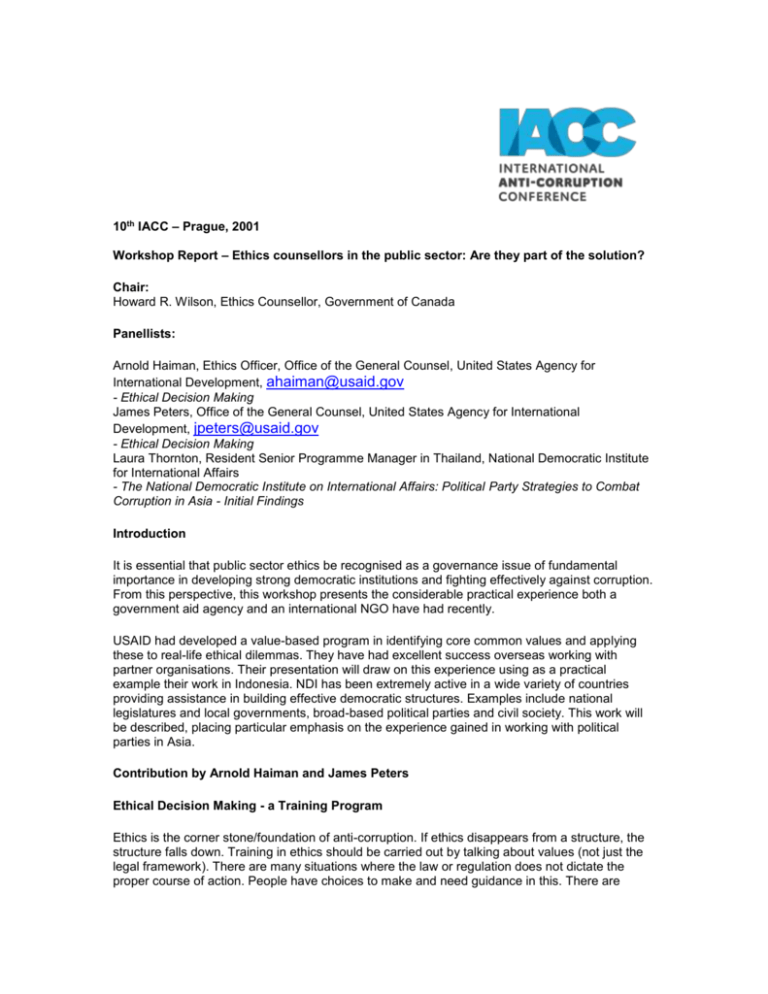Ethics Counsellors In The Public Sector
advertisement

10th IACC – Prague, 2001 Workshop Report – Ethics counsellors in the public sector: Are they part of the solution? Chair: Howard R. Wilson, Ethics Counsellor, Government of Canada Panellists: Arnold Haiman, Ethics Officer, Office of the General Counsel, United States Agency for International Development, ahaiman@usaid.gov - Ethical Decision Making James Peters, Office of the General Counsel, United States Agency for International Development, jpeters@usaid.gov - Ethical Decision Making Laura Thornton, Resident Senior Programme Manager in Thailand, National Democratic Institute for International Affairs - The National Democratic Institute on International Affairs: Political Party Strategies to Combat Corruption in Asia - Initial Findings Introduction It is essential that public sector ethics be recognised as a governance issue of fundamental importance in developing strong democratic institutions and fighting effectively against corruption. From this perspective, this workshop presents the considerable practical experience both a government aid agency and an international NGO have had recently. USAID had developed a value-based program in identifying core common values and applying these to real-life ethical dilemmas. They have had excellent success overseas working with partner organisations. Their presentation will draw on this experience using as a practical example their work in Indonesia. NDI has been extremely active in a wide variety of countries providing assistance in building effective democratic structures. Examples include national legislatures and local governments, broad-based political parties and civil society. This work will be described, placing particular emphasis on the experience gained in working with political parties in Asia. Contribution by Arnold Haiman and James Peters Ethical Decision Making - a Training Program Ethics is the corner stone/foundation of anti-corruption. If ethics disappears from a structure, the structure falls down. Training in ethics should be carried out by talking about values (not just the legal framework). There are many situations where the law or regulation does not dictate the proper course of action. People have choices to make and need guidance in this. There are shared values across a cultural spectrum - "Am I safe in my career if I believe I am doing the right thing?" People have to hope that the people they work with and the company they work for share the same values and work practices, in their trying to find out from people what their values are, and then getting them to apply those values in their life/work. There should be no difference between personal values and workplace values. How the training program is run: Explain what the cost benefits of good ethics are: others will judge whether an individuals´ decisions are ethical or not. Individuals need to apply the values of the people who are making the judgements - developing their reputation as an ethical person. List possible consequences of an ethics decision: good and bad. Identify what people's values are - such as honesty, fairness, compassion, loyalty. Cultural values can often be very different. It is often very difficult to reconcile them. Upper management right through to clerical workers are involved in the training. Brainstorming session to list possible ethics values then have groups discuss which ones are the most important, that need to be shown by everyone: usually everyone has the same values. Explain what a decision-making approach is to be able to use those values to be able to make an ethical decision - using hypothetical situations based on day-to-day situations in their workplace. It is essential that top management supports the process. It is not worthwhile doing if that support is not there. Values based training is an effective means of ethics training to ensure compliance with rules and laws for both governmental and non-governmental organizations. This program is of world-wide application, which we have shared with our own agency, NGOs, other governments around the world. Contribution by Laura Thornton The National Democratic Institute on International Affairs: Political Party Strategies to Combat Corruption in Asia - Initial Findings Political parties help determine the quality and behaviour of elected officials and the norms and practices of political parties and candidates often carry over into national legislatures and governments. If parties do not demonstrate ethical behaviour in their internal practices and campaigns then national level institutional reforms may also ring hollow. In turn, parties often reflect the prevailing political culture, norms and expectations and can reveal the challenges in fighting corruption in society at large. The National Democratic Institute for International Affairs (NDI), an international NGO based in Washington DC and the Council for Asian Liberals and Democrats (CALD), a coalition of political parties based in Manila, have initiated a unique program in Asia on Political Party Strategies to Combat Corruption. The purpose of the program is to support political parties in their efforts to implement internal anti-corruption reforms by promoting greater regional dialogue, sharing lessons learned and identifying best practices. In addition, the program aims to understand better the challenges facing parties with respect to party financing, national legislation and regulations and the general political climate and public expectations. In the first stage of this program, NDI and CALD have been taking stock of the mechanisms parties currently employ to limit opportunities for corruption, whether voluntarily adapted or forced by external legislation. This research has taken place in eight countries: Cambodia, Indonesia, Malaysia, Nepal, Philippines, South Korea, Taiwan and Thailand. The second phase of the program will involve a small regional conference that will bring together party representatives to share lessons learned and best practices in promoting internal party reform. Three steps: comparative research in eight countries bring parties together and talk about best practices create an ongoing resource centre for parties to access People have little faith in what political parties are doing, since they are not transparent. Anticorruption is become the top platform of many political parties. There is conflict between internal behaviour and external legislation. Successful reform has to come from within the party. In every party there are reformers committed to combating corruption. If parties are recognised as actors in the problem of political corruption, they can no longer be excluded from debates on combating corruption. Although external legislation on political finance is one approach to try to clean up internal party practices, significant reform will have to come from within. Parties in Asia are home to many reformers and democrats who want to see good government prevail and several parties have taken steps to root out the scourge of corruption within. It is a critical time to encourage and support these efforts. Moreover, internal party reform can have national repercussions. Party practices and conduct can influence the behaviour and operating procedures of a country's leaders and legislators, as most of them started their political careers in the party system. Anti-corruption indoctrination at the party level can help build political will for and reinforce national reforms and ethical requirements. The reform activities of the DPP in Taiwan, for example, raised the bar on public expectations for national reform and paved the way for legislation modelled on the internal party regulations. A small working group of party officials within the MDP in Korea engendered national anti-corruption legislation. However, focusing on parties alone is also short-sighted. Parties do not operate in a vacuum and tend to reflect the political culture in which they function: as long as systems of patronage and cronyism prevail in society and citizens continue to expect financial payments and more importantly, fail to demand concrete policies and platforms from parties, little will change. Approaches to combat political corruption must be holistic, and strengthening civil society is essential. When citizens gain a better understanding of the meaning of "public office" and begin to advocate for specific policy outcomes and reforms, parties and politicians too will adapt. Main Themes Covered 1. Values based training - an effective means of ethics training to ensure compliance with rules and laws for both governmental and non-governmental organisations. 2. The challenges faced by political parties in a number of Asian countries in their attempts to combat internal corruption . Main Conclusions 1. Values are the cornerstone/foundation of an ethical system. 2. It is vitally important that the top management support ethical training in order for the training to be effective. 3. If political parties are corrupt then the ministers elected from those parties will also continue to be corrupt. 4. Successful reform has to come from within the political party. 5. There cannot be any success whether within organisations or political systems unless there is unequivocal support from the leadership.








